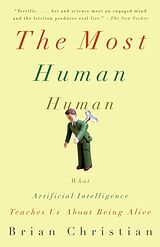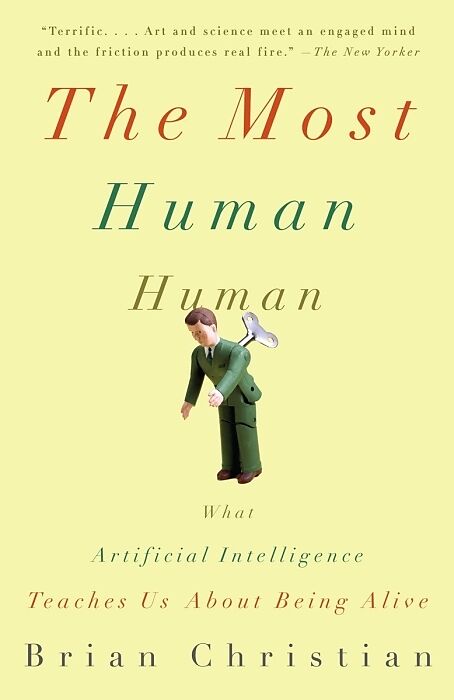The Most Human Human
Einband:
Poche format B
EAN:
9780307476708
Untertitel:
What Artificial Intelligence Teaches Us About Being Alive
Genre:
Religion & Theologie
Autor:
Brian Christian
Herausgeber:
ANCHOR
Auflage:
New.
Anzahl Seiten:
320
Erscheinungsdatum:
06.03.2012
ISBN:
0307476707
Zusatztext 40573377 Informationen zum Autor BRIAN CHRISTIAN has published work in The Atlantic, Wired, The Wall Street Journal, and many literary and scientific publications. He has been featured on The Daily Show with Jon Stewart, NPR's Radiolab, and The Charlie Rose Show, and has lectured at Google, Microsoft, the London School of Economics, and elsewhere. An award-winning poet, Christian holds a degree in philosophy and computer science from Brown University and an MFA in poetry from the University of Washington. The Most Human Human, a Wall Street Journal bestseller, has been translated into nine languages. Christian lives in Philadelphia. Klappentext Each year, the AI community convenes to administer the famous (and famously controversial) Turing test, pitting sophisticated software programs against humans to determine if a computer can "think." The machine that most often fools the judges wins the Most Human Computer Award. But there is also a prize, strange and intriguing, for the "Most Human Human." Brian Christian-a young poet with degrees in computer science and philosophy-was chosen to participate in a recent competition. This playful, profound book is not only a testament to his efforts to be deemed more human than a computer, but also a rollicking exploration of what it means to be human in the first place. 1. Introduction: The Most Human Human I wake up ?ve thousand miles from home in a hotel room with no shower: for the ?rst time in ?fteen years, I take a bath. I eat, as is traditional, some slightly ominous-looking tomatoes, some baked beans, and four halves of white toast that come on a tiny metal rack, shelved vertically, like books. Then I step out into the salty air and walk the coastline of the country that invented my language, despite my not being able to understand a good portion of the signs I pass on my waylet agreed, one says, prominently, in large print, and it means nothing to me. I pause, and stare dumbly at the sea for a moment, parsing and reparsing the sign in my head. Normally these kinds of linguistic curiosities and cultural gaps interest and intrigue me; today, though, they are mostly a cause for concern. In the next two hours I will sit down at a computer and have a series of ?ve- minute instant- message chats with several strangers. At the other end of these chats will be a psychologist, a linguist, a computer scientist, and the host of a popular British technology show. Together they form a judging panel, and my goal in these conversations is one of the strangest things I've ever been asked to do. I must convince them that I'm human. Fortunately, I am human; unfortunately, it's not clear how much that will help. The Turing Test Each year, the arti?cial intelligence (AI) community convenes for the ?eld's most anticipated and controversial annual eventa competition called the Turing test. The test is named for British mathematician Alan Turing, one of the founders of computer science, who in 1950 attempted to answer one of the ?eld's earliest questions: Can machines think? That is, would it ever be possible to construct a computer so sophisticated that it could actually be said to be thinking, to be intelligent, to have a mind? And if indeed there were, someday, such a machine: How would we know? Instead of debating this question on purely theoretical grounds, Turing proposed an experiment. A panel of judges poses questions by computer terminal to a pair of unseen correspondents, one a human confederate, the other a computer program, and attempts to discern which is which. There are no restrictions on what can be said: the dialogue can range from small talk to the facts of the world (e.g., how many legs ants have, what country Paris is in) to celebrity gossip and heavy-duty philosophythe whole gamut of human conversation. Turing p...
“Terrific. . . . Art and science meet an engaged mind and the friction produces real fire.”
—The New Yorker
“Illuminating. . . . An irreverent picaresque. . . . What Christian learns along the way is that if machines win the imitation game as often as they do, it’s not because they’re getting better at acting human, it’s because we’re getting worse. . . . As The Most Human Human demonstrates, Christian has taken his own words to heart. An authentic son of [Robert] Frost, he learns by going where he has to go, and in doing so proves that both he and his book deserve their title.”
—The New York Times Book Review
“Absorbing. . . . Christian covers a great deal of ground with admirable clarity but with a lightness of touch. . . . He also has a real knack for summing up key ideas by applying them to real-life situations. . . . Did Christian become ‘The Most Human Human’? You’ll have to read the book to find out.”
—The Wall Street Journal
“Exhilarating. . . . Reading it, I constantly found my mind pinging off of whatever Christian was discussing and into flights of exploratory speculation about the amount of information encoded in the seemingly routine exchanges of small talk or the reasons why it’s much harder to tell a false story in reverse chronological order. It’s an unusual book whose primary gift lies in distracting you from itself. I’d like to see the computers come up with something like that.”
—Salon
“Fascinating.”
—Jon Stewart
“Brilliant.”
—Financial Times
“Humorous and thought-provoking. . . . A curious look into the history and potential of artificial intelligence, and a brilliant comparison between artificial intelligence and our natural variety. . . . Christian wants to call attention to how special we are, and his book is a success.”
—The Columbus Dispatch
“Excellent.”
—NPR’s “Radiolab”
“Incredibly engrossing.”
—The Onion A. V. Club
“Entertaining and informative.”
—The Economist
“A charming, friendly, and often funny read.”
—The Boston Globe
“Immensely ambitious and bold, intellectually provocative, while at the same time entertaining and witty—a delightful book about how to live a meaningful, thriving life.”
—Alan Lightman, author of Einstein’s Dreams and Ghost
“A book exploring the wild frontiers of chat-bots is appealing enough; I never expected to discover in its pages such an eye-opening inquest into human imagination, thought, conversation, love and deception. Who would have guessed that the best way to understand humanity was to study its imitators?”
—David Eagleman, author of Sum and Incognito
“Remarkable, enjoyable, heartening. A philosophical joyride connecting the thoughts of Aristotle with David Brent. . . . The day that a machine creates work of such wit and originality, we should all be very worried.”
—The Times (London)
“This is a strange, fertile, and sometimes beautiful book. . . . Something like this seems to be going on with the computer. Brian Christian writes with a rare combination of what Pascal took to be two contrary mindsets: the spirit of geometry and the spirit of finesse. He takes both the deep limitations and halting progress of artificial intelligence as an occasion for thinking about the most human activity—the art of conversation.”
—Matthew B. Crawford, author of Shop Class as Soulcraft
&ldq…

Leider konnten wir für diesen Artikel keine Preise ermitteln ...
billigbuch.ch sucht jetzt für Sie die besten Angebote ...
Die aktuellen Verkaufspreise von 6 Onlineshops werden in Realtime abgefragt.
Sie können das gewünschte Produkt anschliessend direkt beim Anbieter Ihrer Wahl bestellen.
Loading...
Die aktuellen Verkaufspreise von 6 Onlineshops werden in Realtime abgefragt.
Sie können das gewünschte Produkt anschliessend direkt beim Anbieter Ihrer Wahl bestellen.
| # | Onlineshop | Preis CHF | Versand CHF | Total CHF | ||
|---|---|---|---|---|---|---|
| 1 | Seller | 0.00 | 0.00 | 0.00 |
